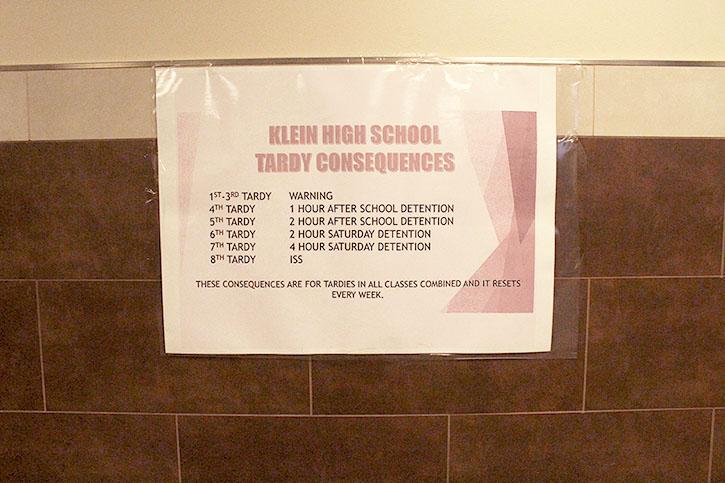New Year, New Tardy Policy
Poster shows the Tardy Policy’s consequences.
To start the new year, and new semester off, the administration came up with a new Tardy Policy. It seems that almost everyone has heard about it, the new policy now works weekly.
“We felt like we were putting more work on the teachers, and we wanted to take some of it off. The AP offices also take more responsibility,” Assistant Principal, Brandon Baker said.
Previously the tardy policy allowed you two warnings per class, per six weeks, giving the students 14 warnings total for the grading period. The teachers were to mark the tardies, if they exceeded the amount of warnings, and then do paper work to send to the AP’s in order for them to make the consequences. Now the new policy allows the students three warnings per week of the grading period, giving them a total of 18 warnings per six weeks, Baker said.
“The teachers just have to enter the attendance through Skyward,” Baker said. “I think [the new policy] will motivate the students to get to class.”
Some, if not all teachers believe the new policy is beneficial, not only to them, but to students also.
“I think over all it’s a positive thing. It does benefit both the teachers and the students. [The students] don’t see when they’re not in class, they’re not learning. When they come in late to class they disrupt whatever has been started,” English teacher Shannon Richardson said. “Let’s say you’re five minutes tardy, you just took 10 to 15 minutes out of your own class time, and your own learning – that’s huge in a 45-minute period, and so it does benefit students to get to class on time.”
With the tardy policy before, the teachers were in charge of tracking the tardies. It was easy to miss marking someone as tardy, and then also having to write a referral every time someone hit a certain amount, causing paperwork for the teachers on top of their other work. Now, the tardies are tracked through Skyward, and when a student hits a certain amount they have new consequences.
“I think [the consequences are] fair. I suspect a lot of teachers around here would tell you that’s a little too lenient, because you could have four tardies in a class, in a five-day period before anything happens to you,” Richardson said. “From that perspective, maybe it is too lenient, but I think it’s a really good starting place because there’s times when stuff happens; you have to go the bathroom, or you get pulled aside for a conversation and the adult doesn’t give you a pass, or you get caught up in talking about whatever, socially, and lost track of time.”
Some students disagree with the new policy for similar reasons. One main reason they seem to bring up is that there are many students, including themselves with difficult passing periods.
“I understand if somebody was being tardy to every class, every week, but it’s harder on my schedule because sometimes I’ll have one or two tardies in a day just because I have to go from the first floor to the fourth floor. I think there could have been a more effective system if the teachers were having to do so much work, but I really don’t think it benefits the students at all,” freshman Emma Taylor said.
There are also some students who believe that the new policy benefits some students and not others, at different times.
“I think it’s at times convenient and at other times a little inconvenient because there’s a lot of late arrivals, traffic, things like that. It really does not benefit everybody,” sophomore Tiana McDaniel said. “I really think we could’ve kept the old policy and found a way around the teachers having to have so much responsibility over the tardy policy.”
Your donation will support the student journalists of Klein High School. Your contribution will allow us to purchase equipment and cover our annual website hosting costs.












